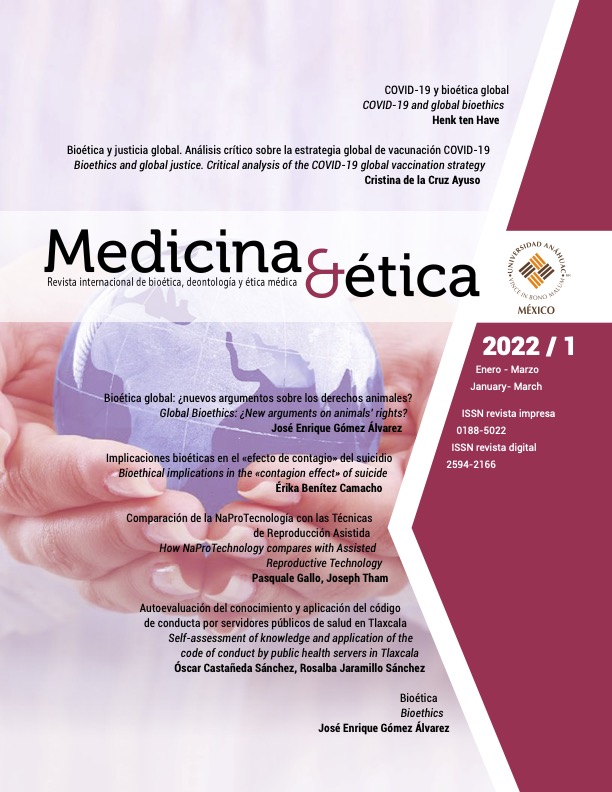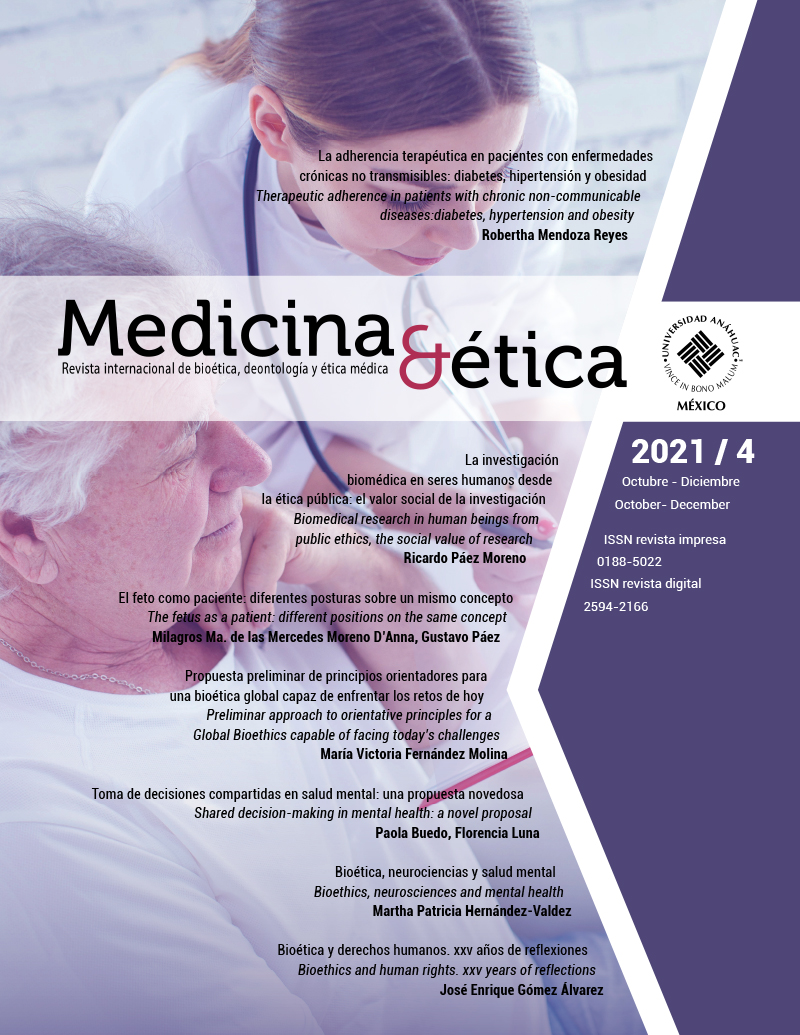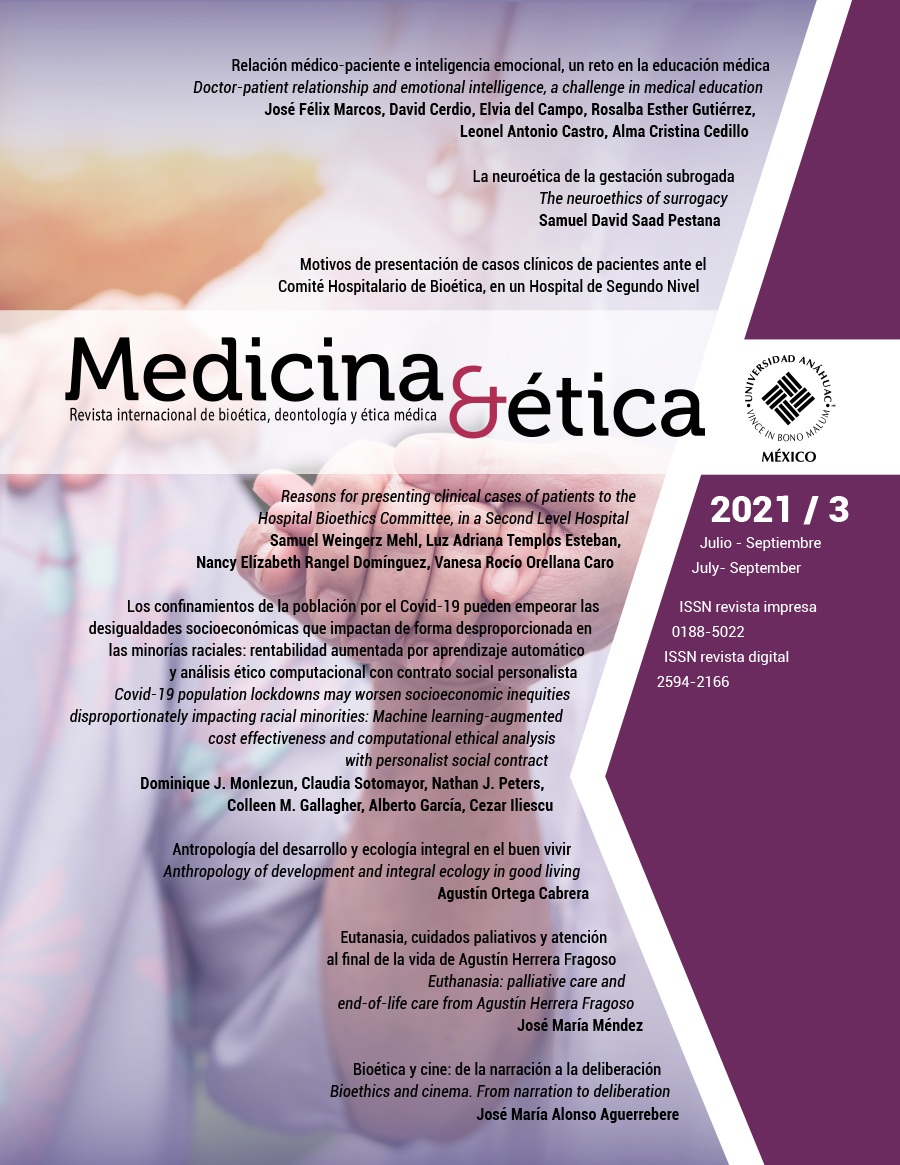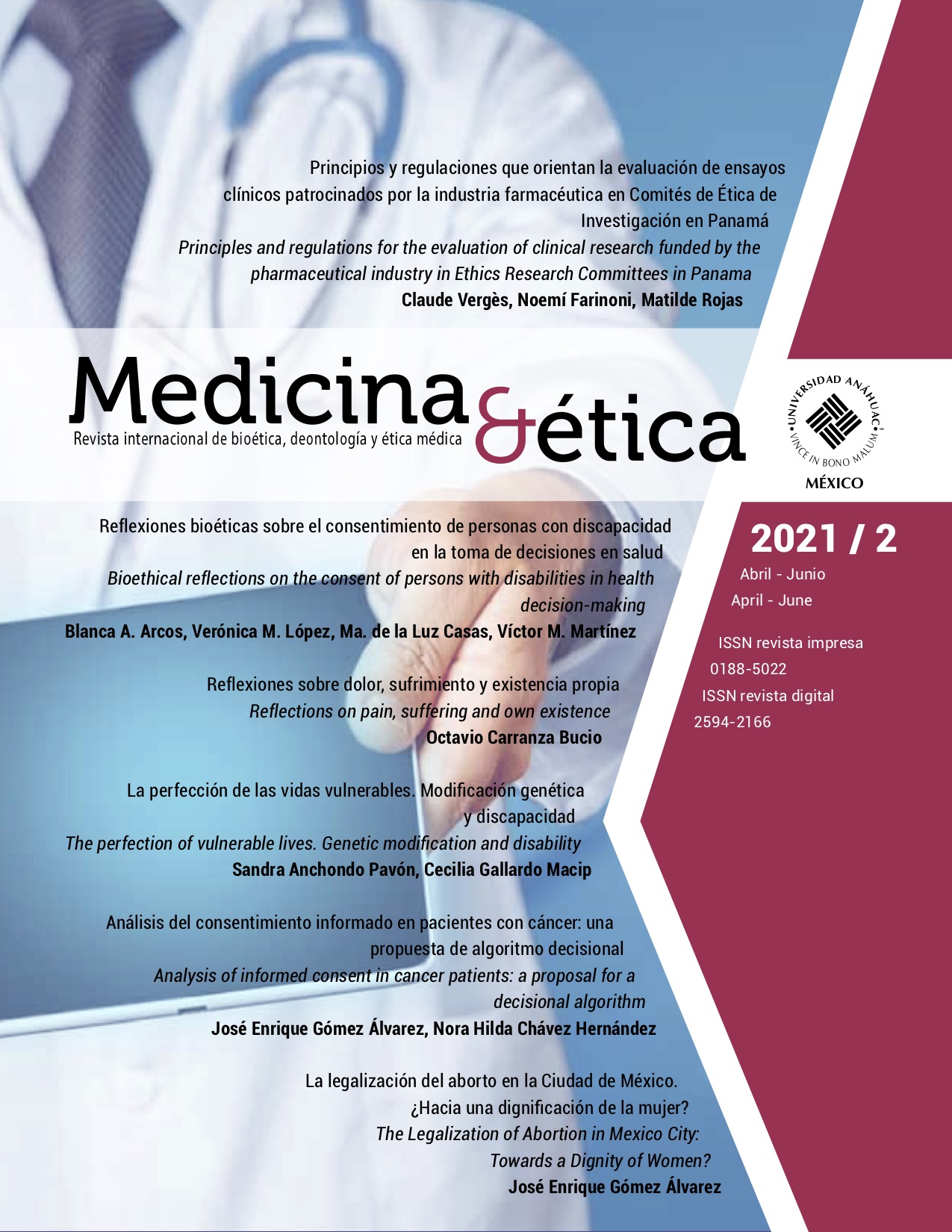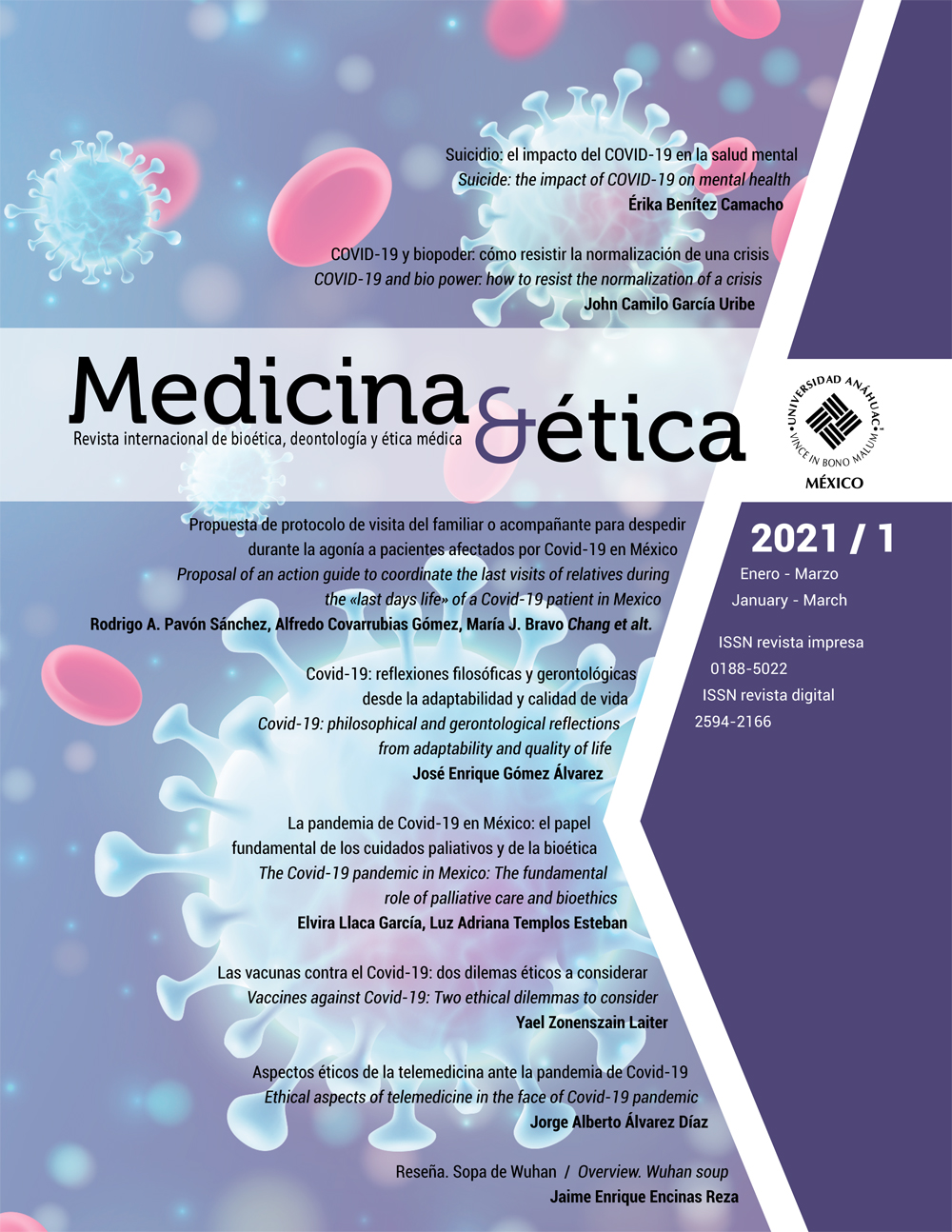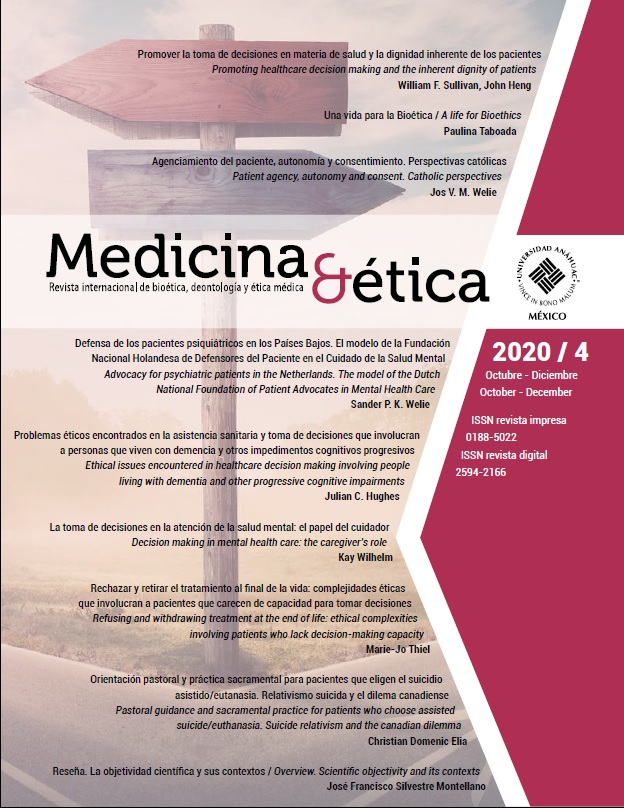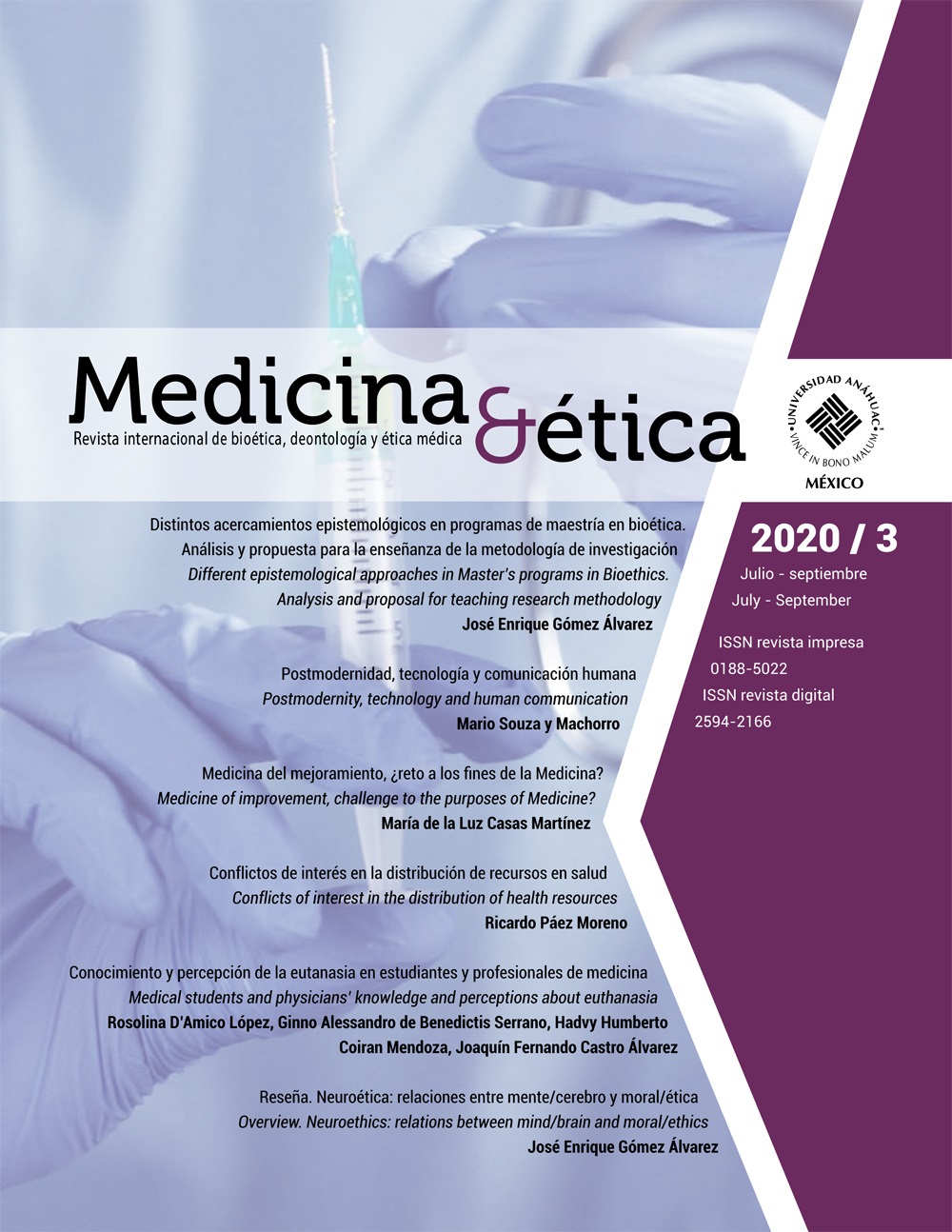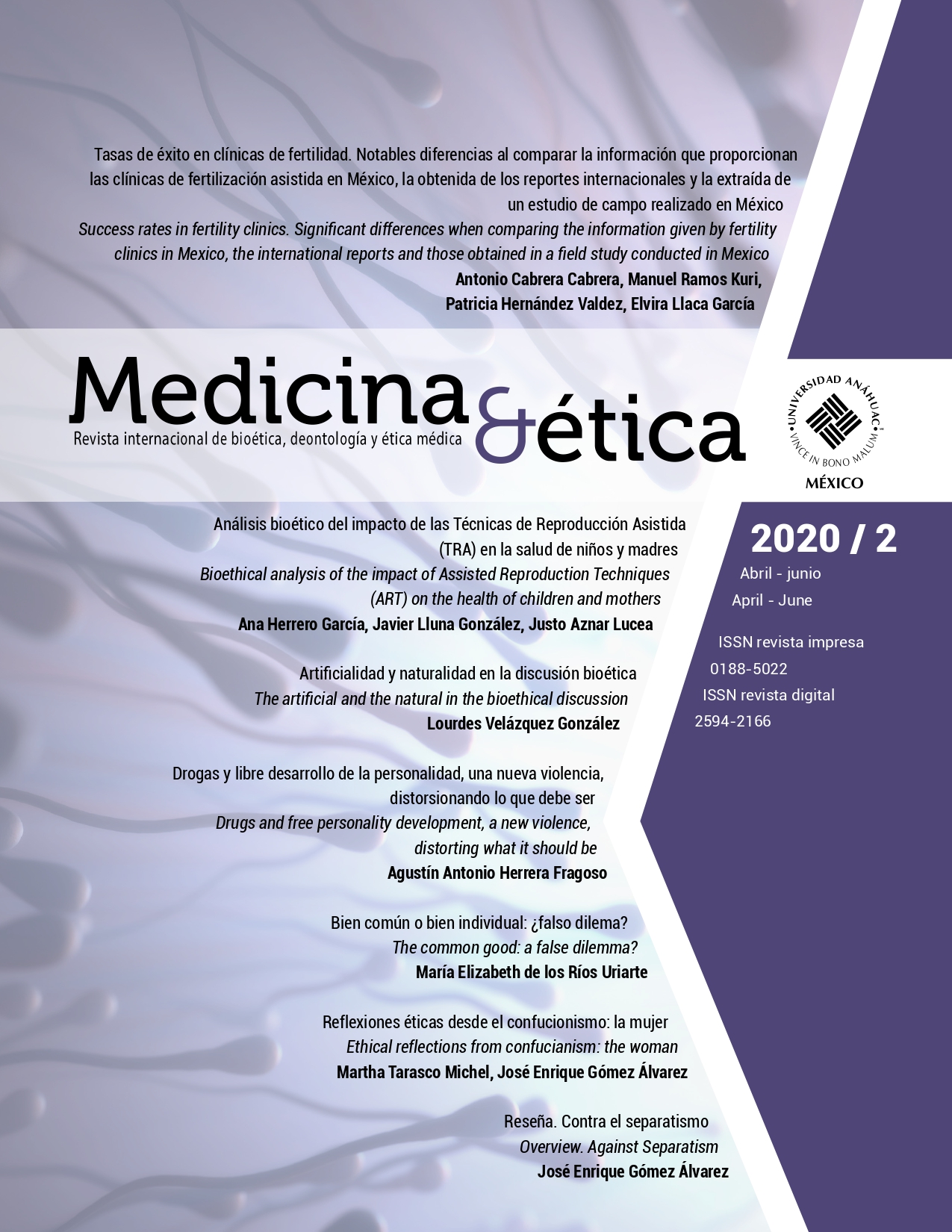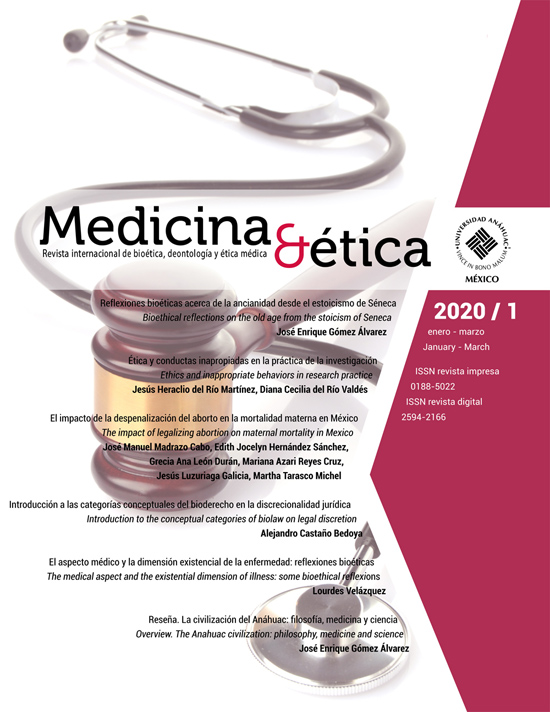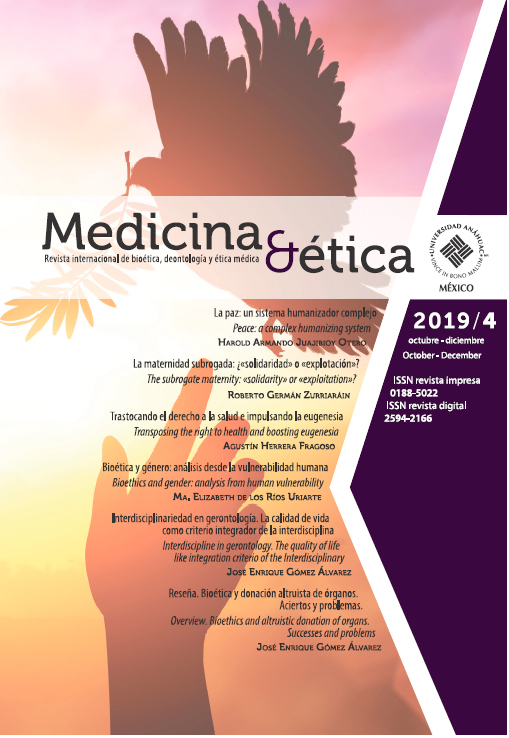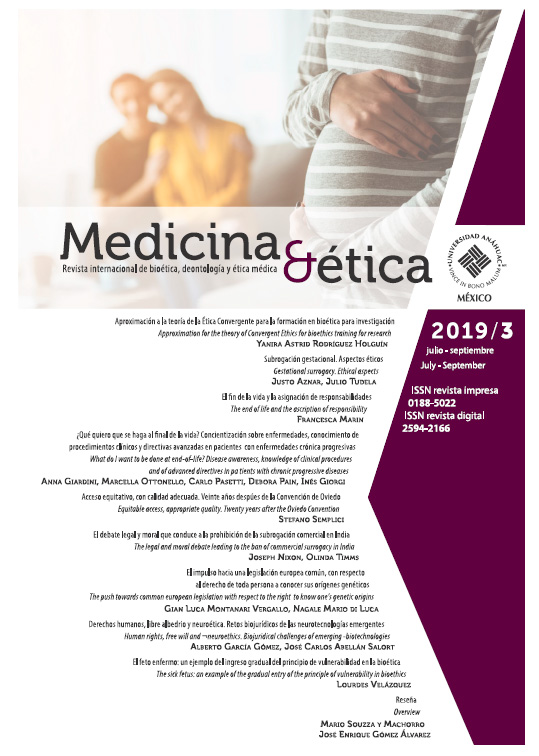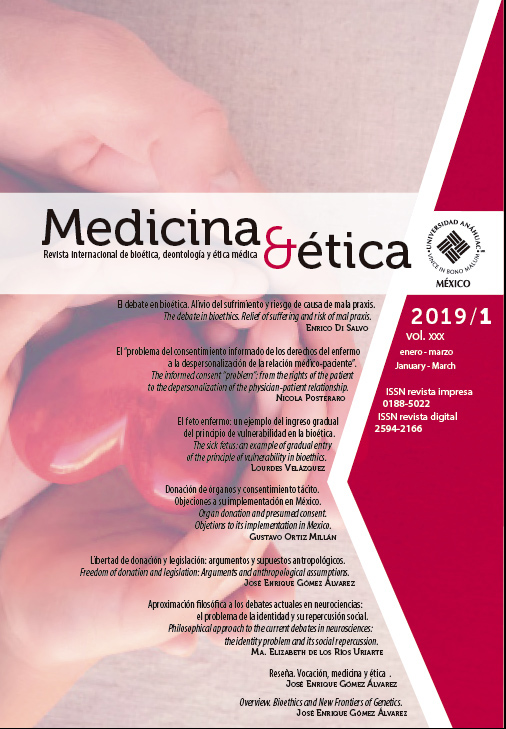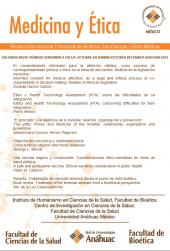Medicina y Ética
Vol. 33 No. 1 (2022)
Content
Introduction, p. 13
Articles:
COVID-19 and global bioethics, p. 53
Bioethics and global justice. Critical analysis of the COVID-19 global vaccination strategy, p. 105
Global Bioethics: ¿New arguments on animals’ rights?, p. 143
Bioethical implications in the «contagion effect» of suicide, p. 185
How NaProTechnology compares with Assisted Reproductive Technology, p. 223
Self-assessment of knowledge and application of the code of conduct by public health servers in Tlaxcala, p. 253
Review:
Bioethics, p. 273
Medicina y Ética
Vol. 32 No. 4 (2021)
With topics that range from concern for the success of medical treatments in the binomial of the doctor-patient relationship, research ethics, intrauterine interventions and their ethical and moral implications, reflection on the current understanding of the autonomy of the patient. patient and the challenges involved in thinking about a system and principles of global action from Bioethics this issue shares the concern of rethinking what has been said and what has been raised so far in Bioethics of our time.
Content
Introduction: pp. 881-889
Articles
Therapeutic adherence in patients with chronic non-communicable diseases: diabetes, hypertension and obesity, pp. 897-923
Biomedical research in human beings from public ethics: the social value of research, pp. 947-969
The fetus as a patient: different positions on the same concept, pp. 989-1009
Preliminary proposal of guiding principles for a global bioethics capable of facing today's challenges, pp. 1029-1059
Shared Decision Making in Mental Health: A Novel Proposal, pp. 1087-1111
Reviews
Bioethics, neurosciences and mental health, pp. 1135-1139
Bioethics and human rights. xxv years of reflections, pp. 1143-1149
Medicina y Ética
Vol. 32 No. 3 (2021)
Content
Introduction: p. 629
Articles
Doctor-patient relationship and emotional intelligence, a challenge in medical education, p. 651
The neuroethics of surrogacy, p. 685
Reasons for presenting clinical cases of patients to the Hospital Bioethics Committee, in a Second Level Hospital, p. 731
Covid-19 population lockdowns may worsen socioeconomic inequities disproportionately impacting racial minorities: Machine learning-augmented cost effectiveness and computational ethical analysis with personalist social contract, p. 781
Anthropology of development and integral ecology in good living, p. 821
Overview
Bioethics and cinema. From narration to deliberation, p. 845
Medicina y Ética
Vol. 32 No. 2 (2021)
This issue addresses highly relevant issues whose central axis is informed consent that responds to the process of transmitting information from the doctor to the patient regarding the diagnosis, prognosis and treatment with a view to whether the patient accepts or rejects it. This issue presents serious and academic discussions as well as proposals for conducting this process ethically and truly reflecting an understanding of the information.
However, we also find others of great interest, such as the dilemmas that arise from the intervention of biotechnologies in the human body and the always constant reflection on human pain and suffering.
Content
Introduction: p. 337
Articles
Principles and regulations for the evaluation of clinical research funded by the pharmaceutical industry in Ethics Research Committees in Panama: p. 375
Bioethical reflections on the consent of persons with disabilities in health decision-making: p. 425
Reflections on pain, suffering and own existence: p. 463
The perfection of vulnerable lives. Genetic modification and disability: p. 519
Analysis of informed consent in cancer patients: a proposal for a decisional algorithm: p. 569
Overview
The Legalization of Abortion in Mexico City: Towards a Dignity of Women?: p. 587
Medicina & Ética
Vol. 32 No. 1 (2021)
This new number opens 2021 with reflections on the ethical and bioethical dilemmas that the pandemic has brought up in the last months with a variety of topics from the development of vaccines against COVID-19 to palliative care, including alarming facts such as the increase in suicide cases all over the world and the practice of telemedicine as a safe and secure method for continuing medical attention.
Thus, the health crisis is presented here as the object of many ethical and bioethical reflections opening possibilites to future dialogues that still will be present in these times.
Content
Introduction: p. 11
Articles
Suicide: the impact of Covid-19 on mental health: p. 41
Covid-19 and biopower: How to resist the normalization of crisis: p. 87
Proposal of an action guide to coordinate the last visits of relatives during the «last days life» of a Covid-19 patient in Mexico: p. 123
Covid-19: philosophical and gerontological reflections from adaptability and quality of life: p. 159
The Covid-19 pandemic in Mexico: The fundamental role of palliative care and bioethics: p. 197
Vaccines against Covid-19: Two ethical dilemmas to consider: p. 233
Ethical aspects of telemedicine in the face of Covid-19 pandemic: p. 271
Overview
Wuhan soup: p. 297
Medicina y Ética
Vol. 31 No. 4 (2020)
The year that we have just finished has been very difficult because of the pandemic and the confinement. For that reason, we have prepared a very special issue, which wants to celebrate first, the multiple teachings that we have acquired. Nevertheless, it is a different issue, because as you will read in the Introduction, it is about
the ethical dilemma of mental disability. These articles were written after a colloquium on this topic, held by the International Association of Catholic Bioethics (IACB) in Ottawa in June 2019.The Academic Director, Dr. William Sullivan, requested our Magazine to be able to publish the articles, which after fulfilling the requirements for peer review, could be seen together in one issue of the Journal.
Medicina y Ética
Vol. 31 No. 3 (2020)
While the edition of this issue is being prepared, the first anniversary
of the death of Professor Elio Sgreccia is commemorated,
which occurred on June 5, 2019. He was the greatest exponent of
ontological personalism, applied to Bioethics, and he was the founder
of the Institute and the Bioethics Center of the University of
the Sacro Cuore in Rome, in 1984. The Medicina e Morale magazine
also founded by him depends from the above-mentioned institutions,
and to which for several years our own magazine was
linked, through an agreement to publish and translate the articles
of the Italian magazine into Spanish. Currently, both magazines
are independent, and the Mexican one has been going out uninterruptedly
four times per year, for thirty years.
Elio Sgreccia has managed to create a school of thought, not
only through the formal teaching of the Institute, as well as its
countless publications and communications on social media, but
also due to the multiple dissemination activities, and the time he
worked in the Pontifical Academy of Life before and during his
presidency.
Medicina & Etica
Vol. 31 No. 2 (2020)
Issue number 2 of our magazine makes an emphasis on... articles on assisted reproduction techniques. The first one by Cabrera A. et al, points out through a very extensive study, which had been carried out in various Reproduction Biology Clinics in Mexico City, jointly with the international reports of the Latin American Network of Assisted Reproduction (RED LARA), that of the European Society of Human Reproduction and Embryology (ESHRE).
The second article on this topic: «Bioethical analysis of the impact of Assisted Reproduction Techniques (ART) on the health of children and mothers», is an invitation to think about the consequences of the techniques. Those techniques which since 1993 (vol 4, Num 2, pp. 47-66 by Dr. Marcó Bach), that we had already published, but that in this article, we add more data about the impact on the mother and the child.
The third article, which without being focused on assisted reproduction, is directly linked in a philosophical reflection on the artificiality presented by Velázquez L., and which focuses on the adaptation of artificiality to the ontological nature of the person. It addresses about the tension of ethicity between what is natural and what is artificial.
Another interesting article is the analysis of the decriminalization of some drugs, such as the misrepresentation of good, for the sake of autonomy, and even the call for their use, such as the development of personality. Herrera Fragoso, considers this fact as a type of violence. This violence, is assumed to destroy Bioethics, bio jury and that «laws lose their nature of being for the benefit and human development», since they must be inspired by universal values that protect the human being.
Being the universal Good, and that does not exclude the Good of anybody else, the article presented by De los Ríos, about the Common Good, justly speaks about reductionism, and the lack of understanding, of what is Good, if society is excluded, to only include the individual Good, which I consider, a welfare.
Finally, an article on Bioethics and Religions, this time on Confucianism and women. In classical Confucianism, women had a very important social role, but always subject to men (father, husband, son, brother) and by age (mother, mother-in-law).
Medicina y Ética
Vol. 31 No. 1 (2020)
In this issue of Medicine and Ethics, various topics are addressed: research ethics, old age and stoicism, abortion, bio-law, medical and existential aspects of the bio-right, and the meaning of the disease.
The first article, «Bioethical reflections on old age from the stoicism of Seneca», by José Enrique Gómez Álvarez, addresses the ethical implications of the conception of old age in the stoicism of Seneca.
The second article, «Ethics and inappropriate behavior in research practice», by Jesús del Río Martínez and Diana del Río Valdés, analyze ethical aspects in the research process, or as they point out, the research system.
In «The Impact on the Decriminalization of Abortion in Maternal Mortality in Mexico», Madrazo et al. demonstrate that the decriminalization of abortion in 2007 in Mexico City, which among one of its justifications was to seek the reduction of maternal deaths caused by clandestine abortions, but the authors point out that he has not fulfilled that assumption.
In «Introduction to the conceptual categories of bio-law in legal discretion», by Alejandro Castaño Bedoya, the ontological and anthropological assumptions of various arguments in the law applied to bioethics are analyzed, such as physicalism or interactionist dualist theories.
Lourdes Velázquez, in «The medical aspect and the existential dimension of the disease: bioethical reflections», emphasizes the need to deepen the existential aspect of the disease as a part of the way of being and living of the human being.
The number closes with the review of the book «The Civilization of Anahuac: philosophy, medicine and science», by de José Enrique Gómez Álvarez.
Medicina y Ética Vol. XXX, Núm. 4
Vol. 30 No. 4 (2019)
Este número del final del año contiene artículos con enfoques múltiples y novedosos. Encabeza esta entrega el artículo sobre la paz, como sistema humanizador complejo, del Dr. Juajilbio y Otero, que aporta un estudio con una impecable metodología interdisciplinar.
Germán Zurriarán, de la Universidad de la Rioja, España, analiza los polos de la maternidad subrogada como un acto solidario y lo contrapone a la explotación de la mujer, y del hijo.
El análisis que elabora el Dr. Herrera Fragoso sobre una resolución jurídica que se encuentra en revisión, la cual impulsa a la eugenesia, se trata de un claro ejemplo de la metodología que emplea la biojurídica, esta rama de la bioética que tiene tan importante desarrollo e importancia.
La Dra. de los Ríos aborda el tema del género desde el enfoque de la vulnerabilidad, que si bien se maneja en la agenda pública, en la literatura ética no es habitual hablar de este aspecto sin victimizar a la persona. Y por último, este número concluye con un artículo sobre el cuidado del paciente geriátrico, desde el cuidado gerontológico.
Este artículo del Dr. Gómez Álvarez enfoca la calidad de vida que se busca en el cuidado de cualquier paciente crónico, como la integración de todas las interdisciplinas que forman parte de la gerontología.
Medicina y Ética volume XXX, number 3
Vol. 30 No. 3 (2019)
This number presents, on one hand, an ethical and bioethical approach to surrogate maternity and the question its commercialization raises. On the other hand, it presents topics concerning law where it is proposed the access to systems that allow people to know their genetic origins, the rights derived from the practices of incorporation of technologies into human brain and its implications in freedom. The same way, this number includes other topics as bioethical trainning in the education of bioethicists towards research and reflections in the end of life.
Medicina y Ética volume XXX, number 2
Vol. 30 No. 2 (2019)
This second issue of the Magazine opens with a great chapter by the National Commissioner of the National Commission Bioethic, Dr. Manuel Ruiz de Chávez, with the collaboration of Gabriela Pineda. In this article, the authors make an analysis about what has happened in Mexico with the Bioethics Hospital Committees, and the Ethics Committees on Research, which boosted and sustained in the different places of the country by the State Commissions on Bioethics, given their relationship with the medical, academic, research, and civil society groups sectors. Besides, it points out the requirements that can improve their operation.
Medicina y Ética volume XXX, number 1
Vol. 30 No. 1 (2019)
In this new year of 2019, the Medicine and Ethics magazine turns three years of its on line setting, offering to our viewers its reading from the Open Journal System platform, which is friendly, and makes clear its processes. Besides, we have improved the requirements for authors and the ethical standards of the same. Our new year’s resolution, is to increase the variety of authors, so we will be very honored that our readers feel encouraged to write, and in accordance to the standards above cited, will send their valuable material to us.
The articles which are presented in this issue, have the common source of showing in all of them, how the scientific advances and legislative changes propose new reflections in Bioethics.
Medicina y Ética Vol. XXIX, Number 4
Vol. 29 No. 4 (2018)
This year’s fourth issue presents two basic subject matters: One of them is about social bioethics, which is captured in articles about violence. The other subject matter deals with ethical decision making, and its anthropologic basis, which is exemplified in various topics of medical practice.
Medicina y Etica Vol XXIX No 3
Vol. 29 No. 3 (2018)
As you can see, in this issue we have increased the number of articles to seven, and in this occasion, also an overview of a really extraordinary book, which I personally recommend. All this issue includes articles about various and innovative subject matters. In the first article, related to Moral Anguish or Distress and futile treatments, and more specifically regarding the cognitive research on the perception of three Nursing students namely, Conoci, Cristofori, and Galletti, who point out a really new ethical pro Editorial
blem, and a very subtle one: it is the moral anguish felt, in this case by Nursing students, when during clinical practice they see that Ethics is limited to a set of deontological rules, which become insufficient for an Ethics of maximums and not of minimums, that furthermore, is the one required by the hyper medical specialization. The case has been studied using a special methodology, and I think it is a study, that should be replicated in other scenarios. From a management point of view, there are two articles which, although different, derive themselves from this subject matter. On his behalf, Mancini also addresses a very seldom explored subject matter: The one about experimenting on him/her self, as a research subject. The authorAs in previous issues, Claudio Sartea presents and explains to us, all the possible interpretations of a dissemination article, where his own conscientious objection is objected. Thus Sartea challenges this analysis, and supports the judicial and ethical legality, based on Human Rights on conscientious objection, which nowadays is, a debate issue in Mexico, where the intention is to suppress that duty/right (paraphrasing Sartea), which a physician has. Finally there are two articles that propose, one in an openly way, and the other one in a kind of hidden way, the narrative methodology, for Bioethics. Giardina S., and Spagnolo A., show to us The History of Medicine, using a series of small stories for that purpose. On his/her behalf Braga P., analyzes a movie picture from the Bioethics point of view. In this third issue, we wanted to share with you, these subject matters that are handled in a fresh and innovative manner, because in terms of Bioethics, the growth is a continuous process.
Martha Tarasco MD PhD Editor
Medicina y Ética
Vol. 29 No. 2 (2018)
ABSTRACT
In this number we are publishing three articles around end of life issues. All citizens of the world that if in any of our countries, Euthanasia has not been legally approved, or de-penalized yet know it, it will soon become. As it is the cheapest way to deal with the problem caused by the aging of population, due to the baby boost demographic trend. Iannone, Lerro, Casale and Sacchini, show the creativity and possibilities of Palliative Care through the Antea Bioethics Committee, specially focusing on the various functions of medical personnel, and family members. All this in the particularly sensitive situation around palliative care and pain therapy.
The article» The temptation of neonatal euthanasia in the management of seriously compromised infants» written by Roberta Spola we can read that even if the development of advanced technologies has resulted in a surge of intensive care and assistance of extremely preterm newborns with severe diseases, as to move the survival limit. At the same time, it has made its way in recent years a eugenic attitude towards so-called life-limiting illnesses.
Several issues arise the questions of treating or stop treatment as well as the importance of parentsWe also have two articles on research ethics. The first is «A new limit for investigation on human embryos? » written by Dino Moltisanti. It turns out to be one of the most useful articles that any personalistic bioethicist should need to read, to know scientific arguments about the human personality of the embryo. The article shows the weakness of the criteria of the so-called pre-embryo and the arbitrary setting of the 14-day limit.
This poses the question, on where to establish the new limit? Everything is a succession of stages of a continuous and independent process. There is no difference an embryo moral quality, related to his age. The selection and experimentation in human embryos must be totally prohibited, to respect their inalienable intrinsic dignity.
«Putting health in the marketplace. Ethical issues about providing online health risk information», by Francesca Marin talks about the FDA’s approval to market genetic tests directly to consumers, without supervision of healthcare professionals. The idea is that informing customers of their genetic susceptibility may motivate them to change their health-related behavior, reducing the risk of the disease’s onset.
Actually, besides other ways of getting access to health information and services through internet, direct-to-consumer genetic tests fosters a consumerist approach to healthcare. But the article discusses if it is a good for the patient, addressing problems with clinical validity as well as their implications for healthcare systems.
Secondly, ethical concerns regarding putting health in the marketplace will be analyzed by examining the progressive shift from healthcare professional-patient fiduciary relationship to provideruser consumerist relationship.
At last we are publishing an article that with the abortion example analyzes different medical oaths. That is the paper written by a group of authors from Argentina Rancich; Merino; Aruanno; Pérez; Donato; Gelpi. They found out that while ancient and medieval oaths explicitly prohibit abortion, contemporary oaths are ambiguous on the topic. Contemporary oaths use ambiguous terms, often leaving the commit We hope you enjoy reading this interesting number of the journal.
Martha Tarasco MD PhD
Editor
Medicina y Ética
Vol. 29 No. 1 (2018)
ABSTRACTSTRACT
Bioeconomy is a term used to designate the commercialization of human body and registered as much in techno-scientific research, as in labor processes. This "clinical work" that comes from the economical notion of human capital trying simultaneously to transform the most intimate bodily functions into «commercial goods and services», as Alessio Musio tells us in his creative reflection of the first article of this number «The in-human capital. Bioethics
in front of "clinical labor".
The jewel of the crown is the interview to Cardinal Elio Sgreccia, the greatest exponent of Personalistic Bioethics in the article «The personalism in the thought of Elio Sgreccia. Interview with Elio Sgreccia» by Marcelino Pérez Bermejo. It explains his thought about human dignity through Ontological Personalism.
The biostatistician figure on Ethics Committees. Is an article written by Bruno Mario Cesana and Elia Mario Biganzoli. They propose the guidelines for the role of the biostatistician and for his activity in the review of protocols of the studies proposed to the Ethics Committees. It is a very new proposal, in which the skills of the biostatistician are described, as well as their role in the ethics committees. And it is wise to consider that statistics is a helpful tool in the ethical judgement of a research, as well as in the evidence based on medical knowledge, in clinical dilemmas.
We have considered important to publish the editorial of a past number of Medicina e Morale, written by Antonio Spagnolo, because UNESCO has promoted World Bioethics Day, to promote the human dignity and rights in the world.
Martha Tarasco MD PhD
Editor
Medicina y Etica Vol XXVIII No 4
Vol. 28 No. 4 (2017)
Tarasco Michel, Martha (2017). Medicina y Etica Vol XXVIII No 4.Huixquilucan, Estado de México: Universidad Anáhuac México, 2017. ISBN 0188-5022.
Resumen: Corresponsabilidad. Relación médico-paciente. Lex artis ad hoc. Obligaciones de medios. Obligaciones de resultado, Health Technology Assessment, dominio ético, epistemología, relación, persona, valor, fin-de-la-vida, organización, prevención, consciencia, objeción de la conciencia, relativismo moral, higiene, cine, seguridad/incolumidad, salud pública, bioética narrativa, persuasión, Debido al auge excesivo, que a mi juicio, se le ha dado a la autonomía del paciente, la objeción de conciencia es la posibilidad ética que tiene el médico de no ser tratado como un medio técnico por el paciente y/o su familia.En el segundo grupo de temas que plantean cuestiones tradicionales de discusión en la ética contemporánea, como la autonomía y la beneficencia. El título del artículo «El Principito», que se refiere a que lo que es importante está escondido o no es aparente. Está ejemplificado a través de cuatro temas: el contexto del fin de la vida, la relación médico-paciente, la ética de la organización, la prevención/precaución. En estos temas analizan los valores implicados y los consideran como aquello que es «invisible ». Esto debe ser reconocido como un dato clínico importante, en lo gnoseológico y en lo epistemológico, porque solo se logra en la interrelación humana y se proyecta al futuro ecológico porque al actuar éticamente se salvaguarda la vida. Para un proceso esencial en la relación médico paciente es el consentimiento informado, porque propicia la decisión libre, autónoma y digna por parte del paciente sobre su cuerpo, salud y entorno social. Ello favorece la corresponsabilidad en la toma de decisión de ambas partes. «Una vacuna segura (safe) y convincente (persuasive). Consideraciones ético-narrativas en tema de salud pública» se examinan los problemas del paternalismo, autonomía y salud pública. El número cierra con la reseña del libro «Tratamiento del neonato terminal desde el punto de vista bioético», (EUNSA/Astrolabio, 2017), de la autora Lourdes Velázquez González PhD realizada por María de la Luz Casas. Este libro analiza la reacción de los padres ante el caso de los bebés con extremado peso bajo al nacer que representa un caso límite para la medicina, porque los pacientes son considerados irrecuperables. La autora del libro piensa que las redes de apoyo social son una posible solución para la familia de estos niños
Medicina y Etica Vol XXVIII No 3
Vol. 28 No. 3 (2017)
Tarasco Michel, Martha (2017). Medicina y Etica Vol XXVIII No 3.Huixquilucan, Estado de México: Universidad Anáhuac México, 2017.
Resumen: El presente volumen podría dirigirlo una palabra central: umbrales. Varios de los artículos presentados plantean esos límites delgados conceptuales y empíricos en temas emergentes en bioética como el envejecimiento y otros temas con más historia, como la utilización del placebo en la investigación. Inclusive desde la biojurídica, a pesar de tratados, su aplicación se queda justamente en el inicio de la acción. The present volume could be described just in one word: thresholds. Several of the articles included establish those conceptual and empirical fine limits in emerging subjects of Bioethics, such as aging and another matters with quite more background, like the use of placebo in research. From the scope of Biolaw, despite treaties, its implementation stays precisely in the beginning of the action.
Medicina y Etica Vol. XXVIII No. 2
Vol. 28 No. 2 (2017)
Tarasco Michel, Martha (2017). Medicina y Etica Vol. XXVIII No. 2.Huixquilucan, Estado de México: Universidad Anáhuac México, 2017. ISSN {Pub_ISBN}.
Resumen: La Bioética se caracteriza por humanizar o quizás, con una expresión más afortunada sea la de reconocer lo humano en la realidad. En este número me parece que le queda de modo excelente esta aproximación. Bioethics is characterized by the impulse to humanize; or it might be better stated as the acknowledgement of the human aspect of reality. In this number, I believe this approach is quite pertinent.
Medicina y Etica Vol. XXVIII No. 1
Vol. 28 No. 1 (2017)
Tarasco Michel, Martha (2017). Medicina y Etica Vol. XXVIII No. 1.Huixquilucan, Estado de México: Universidad Anáhuac México, 2017. ISSN {Pub_ISBN}.
Resumen: Estimados lectores y autores de "Medicina y Ética": Tal como lo habíamos anunciado en el número 4 del 2016, a partir de este año nuestra revista será publicada en la web con free Access. Sin embargo, a pesar de ser gratuita, no es libre: es decir que vamos a cuidar la integridad en la investigación, para evitar el plagio. Y además está traducida al inglés, para que más lectores puedan acceder a ella, ya que sus excelentes artículos deben poderse leer por todos. Agradecemos, desde luego, la gentileza de la Revista "Medicina e Morale" y de sus autores, por permitirnos compartir algunos de sus artículos, como lo hemos venido haciendo desde el inicio, hace 26 años, de nuestra Revista. En este primer número hemos publicado dos artículos relacionados con la Biotecnología, y que nos ayudan a reflexionar sobre el espejismo que a veces la biotecnología proyecta, y que es la transformación y traspaso de los límites de la corporeidad. Éstos son: La edición génica de la línea germinal, de Agneta Sutton; el artículo sobre transhumanismo de MarieJo Thiel. Además, tenemos un extraordinario artículo sobre bioética y ecología publicado por el Profesor José Miguel Serrano Ruiz Calderón, y dos artículos que se relacionan a través de la biojurídica, aunque el contenido es diverso entre sí: y es el de Claudio Sartea sobre la Investigación y la Biojurídica, Alessia Maccaro sobre la Emancipación del paciente con limitaciones intelectuales. Este último no refiere directamente leyes o normativas, pero para cualquier país resulta de utilidad planear qué se debe hacer jurídicamente en este sentido. Esperamos seguir contando con nuestros distinguidos lectores e investigadores, y deseamos a todos que disfruten y recomienden nuestra Revista. Martha Tarasco MD PhD. Coordinadora Editorial Dear Readers and Authors of «Medicine and Ethics»: As announced during 2016 in Issue Number 4, starting this year our magazine will be published on the web with free access. However, despite having no cost, it is not really free: meaning that we will be carefully preserving investigative integrity in order to avoid plagiarism. In addition, the publication will be translated into English so that more readers can access the magazine and read its excellent articles. We are grateful, of course, for the kindness of the magazine «Medicina e Morale» and its writers for allowing us to share some of their articles, as we have been doing since starting our magazine some 26 years ago. In this first issue, we have published two articles related to biotechnology that help us to reflect on the illusion that biotechnology sometimes projects, which is the transformation and encroachment on the limits of corporeality. These are Gernet’s version of the germline by Agnetta Sutton and the article on transhumanism by Marie Jo Thiel. In addition, we have an extraordinary article on bioethics and ecology published by Professor José Miguel Serrano Ruiz Calderón, and two articles that are related through biolaw, although the content of the two is different. The article by Claudio Sartea is about investigation and biolaw, while that by Alessia Maccaro is on the emancipation of patients with intellectual limitations. The lat ter does not directly refer to laws or regulations, but for any country it is useful to plan what should be done legally in this regard. We look forward to continued support from our distinguished readers and researchers, and we hope that everyone will keep enjoying and recommending our magazine. Martha Tarasco MD PhD. Editor
Medicina y Etica Vol. XXVII No.2
Vol. 27 No. 2 (2016)
Tarasco Michel, Martha (2016). Medicina y Etica Vol. XXVII No.2.Huixquilucan, Estado de México: Universidad Anáhuac México, 2016. ISSN {Pub_ISBN}.
Resumen: Los MInistros de la Suprema Corte de Justica de la Nación de México (ACJN), aprobaron el 4 de noviembre de 2015, el uso recretaivo de la marihuana, a cuatro personas que promovieron un amparo contra la prohibición legal para sembrar y consumir su propia cannabis. Pero si se llegara a emitir el mismo veredicto en otros cuatro casos similares, la sentencia se aplicaría a todo el país. Esto a pesar de que el Ministro promovente "en ningún momento dijo que la marihuana es inocua". Las Razones son entre otras, disminuir el narcomenudeo, que es una fuente de violencia
Medicina y Etica Vol. XXVI No. 2
Vol. 26 No. 2 (2015)
Tarasco Michel, Martha (2015). Medicina y Etica Vol. XXVI No. 2.Huixquilucan, Estado de México: Universidad Anáhuac México, 2015. ISSN {Pub_ISBN}.
Resumen: Este año decretado como año de la familia, ha sido también un año de promoción de uniones homosexuales en todo el mundo. En particular en México, el cambio constitucional se realizó casi sin debate, sin información de causas, consecuencias o tan siquiera costos. Parecería que simplemente instancias multinacionales llegaros a un consenso, ignorando el método experimental, la rectitud epistemológica, y el procedimiento erístico -como señala aldo Rocco Vitale, en su artículo "Riesgos de una epistemología contractualista"- (el autor ejemplifica el hecho con el problema astronómico de reclasificación de los planetas). En él enfatiza que terminan siendo unos pocos los que toman la decisión, abrogándose a sí mismos el derecho de hacerlo, a pesar de evidencias científicas.
Medicina y Etica Vol. XXVI No. 1
Vol. 26 No. 1 (2015)
Tarasco Michel, Martha (2015). Medicina y Etica Vol. XXVI No. 1.Huixquilucan, Estado de México: Universidad Anáhuac México, 2015. ISSN {Pub_ISBN}.
Resumen: Uno de los temas que la perinatología ofrece, y que sin duda interesa a todos los nuevos padres, es la posibilidad de conservar la sangre del cordón umbilical para sus hijos. Se suelen preguntar si vale o no la pena, ya que representa un gasto importante mantenerlo de por vida, y también se cuestiona si no es solo un negocio del banco de sangre. Como bioeticistas, este tema nos atañe en primer lugar en cuanto a la pregunta ética más de fondo: ¿existe una bondad en tomar esta precaución, para una posibilidad tan remota de ser requerida, como fuente de células troncales? Justamente el artículo de Agustín Losada Pescador analiza la justificación ética de dichos bancos, y provee con ello una base para el análisis de otros problemas.

